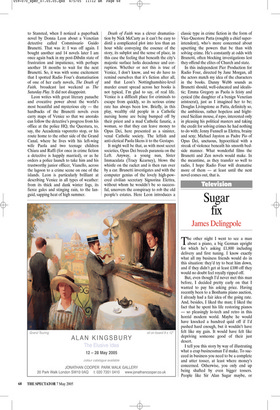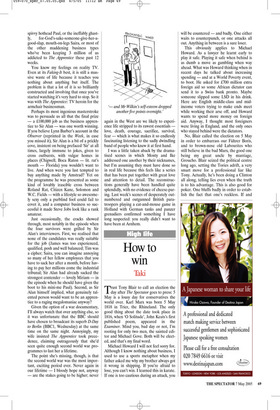Sugar fix
James Delingpole
The other night I went to see a man about a piano, a big German upright for which he’s asking £1,800 including delivery and first tuning. I know exactly what all my business friends would do in this situation: they’d try to beat him down, and if they didn’t get at least £100 off they would no doubt feel royally ripped off.
But, even though I’d never met this man before, I decided pretty early on that I wanted to pay his asking price. Having recently been to a Bonhams piano auction, I already had a fair idea of the going rate. And, besides, I liked the man; I liked the fact that he spent his life restoring pianos — so pleasingly lo-tech and retro in this horrid modern world. Maybe he would have knocked a hundred quid off if I’d pushed hard enough, but it wouldn’t have felt like my gain. It would have felt like depriving someone good of their just desert.
I tell you this story by way of illustrating what a crap businessman I’d make. To succeed in business you need to be a complete and utter tosser, at least where money’s concerned. Otherwise, you only end up being shafted by even bigger tossers. People like Sir Alan Sugar maybe, or spivvy hothead Paul, or the ineffably ghastly, for-God’s-sake-someone-give-her-agood-slap, mouth-on-legs Saira, or most of the other maddening business types who’ve been keeping 3 million of us addicted to The Apprentice these past 12 weeks.
You know my feelings on reality TV. Even at its Faking-It best, it is still a massive waste of life because it teaches you nothing about anything but itself. The problem is that a lot of it is so brilliantly constructed and involving that once you’ve started watching it’s very hard to stop. So it was with The Apprentice: TV heroin for the armchair businessman.
Perhaps its most ingenious masterstroke was to persuade us all that the final prize — a £100,000 job as the business apprentice to Sir Alan — was one worth winning. If you believe Lynn Barber’s account in the Observer (reprinted in the Week, in case you missed it), Sir Alan is a bit of a prickly cove, insistent on being prefaced ‘Sir’ at all times, largely immune to jokes, given to cross outbursts, with vulgar homes in places (Chigwell, Boca Raton — lit. rat’s mouth — Florida) you wouldn’t want to live. And when were you last tempted to buy anything made by Amstrad? Yet on the programme he was presented as some kind of lovably irascible cross between Roland Rat, Citizen Kane, Solomon and W.C. Fields — with a lifestyle so awesomely sexy only a purblind fool could fail to covet it, and a computer business so successful it made Steve Jobs look like a rank amateur.
Just occasionally, the cracks showed through, most notably in the episode when the four survivors were grilled by Sir Alan’s interviewers. First, we realised that none of the candidates was really suitable for the job (James was too experienced, qualified, posh and well balanced; Tim was a cipher; Saira, you can imagine annoying so many of her fellow employees that you have to sack her after a month, before having to pay her millions come the industrial tribunal; Sir Alan had already sacked the strongest contender — lovely Miriam — in the episode when he should have given the boot to his mini-me Paul). Second, as Sir Alan himself implied, what genuinely talented person would want to be an apprentice to a raging megalomaniac anyway?
Given the option of a war documentary, I’ll always watch that over anything else, so it was unfortunate that the BBC should have chosen to broadcast its superb D-Day to Berlin (BBC1, Wednesday) at the same time on the same night. Annoyingly, my wife insisted The Apprentice took precedence, claiming outrageously that she’d seen quite enough second world war programmes to last her a lifetime.
The point she’s missing, though, is that the second world war was the most important, exciting period ever. Never again in our lifetime — I bloody hope not, anyway — are the stakes going to be higher; never again in the West are we likely to experience life stripped to its rawest essentials love, death, courage, sacrifice, survival, fear — which is what makes it so endlessly fascinating listening to the sadly dwindling band of people who knew it at first hand.
I was a little taken aback by the dramatised scenes in which Monty and Ike addressed one another by their nicknames, but I’m assuming they must have done so in real life because this feels like a series that has been put together with great love and attention to detail. The reconstructions generally have been handled quite splendidly, with no evidence of cheese-paring. Last week’s scenes of desperately outnumbered and outgunned British paratroopers playing a cat-and-mouse game in Holland with German tanks and panzer grenadiers confirmed something I have long suspected: you really didn’t want to have been at Arnhem.




























































 Previous page
Previous page